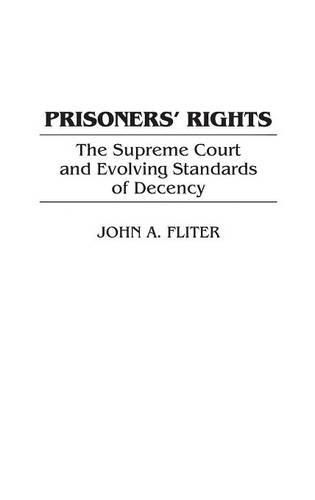
Prisoners' Rights: The Supreme Court and Evolving Standards of Decency
(Hardback)
Publishing Details
Prisoners' Rights: The Supreme Court and Evolving Standards of Decency
By (Author) John A. Fliter
Bloomsbury Publishing PLC
Praeger Publishers Inc
30th December 2000
United States
Classifications
Tertiary Education
Non Fiction
Constitution: government and the state
Human rights, civil rights
Crime and criminology
342.73087
Physical Properties
Hardback
240
Description
Prisoners' rights is an area of constitutional law that is often overlooked. Combining an historical and strategic analysis, this study describes the doctrinal development of the constitutional rights of prisoners from the pre-Warren Court period through the current Rehnquist Court. Like many provisions in the Bill of Rights, the meaning of the Eighth Amendment's language on cruel and unusual punishment and the scope of prisoners' rights have been influenced by prevailing public opinion, interest group advocacy, andmost importantlythe ideological values of the nine individuals who sit on the Supreme Court. These variables are incorporated in a strategic analysis of judicial decision making in an attempt to understand the constitutional development of rights in this area. Fliter examines dozens of cases spanning 50 years and provides a systematic analysis of strategic interaction on the Supreme Court. His results support the notion that justices do not simply vote their policy preferences; some seek to influence their colleagues and the broader legal community. In many cases there was evidence of strategic interaction in the form of voting fluidity, substantive opinion revisions, dissents from denial of certiorari, and lobbying to form a majority coalition. The analysis reaches beyond death penalty cases and includes noncapital cases arising under the Eighth Amendment, habeas corpus petitions, conditions of confinement cases, and due process claims.
Reviews
"Generations of scholars have studied legal change--and, in so doing, have brought a multitude of perspectives to bear on it, from the doctrinal and jurisprudential to the behavioral and institutional. And, yet, for all their differences, many of the resulting studies share a common feature: a focus on highly salient and controversial areas of law. As Professor Fliter reminds us, if we are to develop a fuller appreciation of the subject, we must move beyond the salient and controversial areas of the law that some regard as less interesting and exciting. Prisoners' rights is one, and Fliter does a masterful job in exploring and explaining the profound--and, yes, fascinating--legal changes that have occurred over the last 200 years."-Christopher E. Smith Professor of Criminal Justice Michigan State University
"Prisoners' Rights: The Supreme Court and Evolving Standards of Decency provides a valuable account of the development of constitutional rights in the context of corrections. Professor Fliter has carefully drawn together material on the U.S. Supreme Court's involvement in shaping prisoners' rights and placed that material within the analytical framework of political scientists' studies on judicial decision making and policy making. This book will be a useful resource for anyone interested in the U.S. Supreme Court, judicial policy making, or corrections law."-Lee Epstein Edward Mallinckrodt Distinguished University Professor of Political Science Professor of Law Washington University
Fliter offers a rich and substantive framework within which to reflect meaningfully about society's need to ensure fundamental human rights even to those who have violated fundamental human and legal rights. Highly recommended for all libraries.-Choice
Fliter's book is nothing less than successful. The author's dual contribution to the study of constitutional law and judicial politics make this essential background reading for students facing doctoral exams in public law. Each chapter is impeccably referenced and the essential features of each Supreme Court decision are immediately apparent.-The Law and Politics Book Review
"Fliter offers a rich and substantive framework within which to reflect meaningfully about society's need to ensure fundamental human rights even to those who have violated fundamental human and legal rights. Highly recommended for all libraries."-Choice
"Fliter's book is nothing less than successful. The author's dual contribution to the study of constitutional law and judicial politics make this essential background reading for students facing doctoral exams in public law. Each chapter is impeccably referenced and the essential features of each Supreme Court decision are immediately apparent."-The Law and Politics Book Review
Author Bio
JOHN A. FLITER is an Associate Professor of Political Science at Kansas State University. His articles have appeared in Law and Society Review, Southeastern Political Review, Journal of Church and State, and Free Speech Yearbook. His research interests include Supreme Court decision making, civil rights and liberties, and judicial policy impact and implementation.
